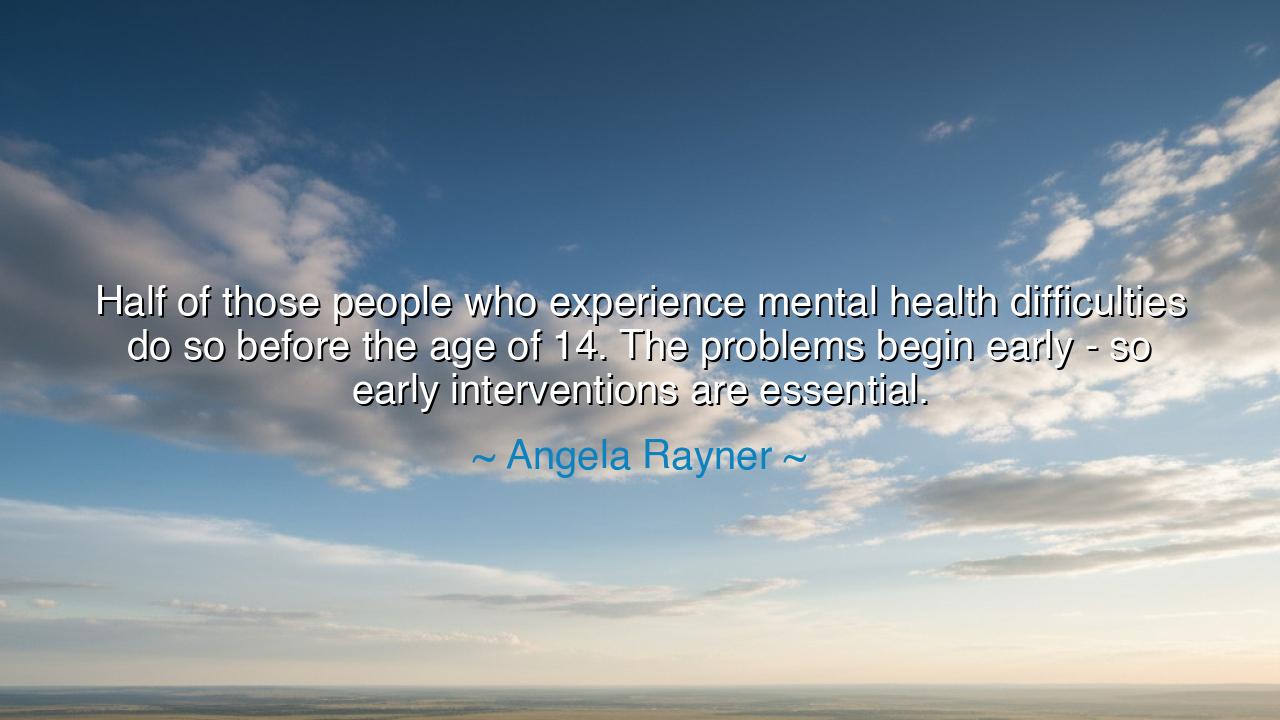
Half of those people who experience mental health difficulties do
Half of those people who experience mental health difficulties do so before the age of 14. The problems begin early - so early interventions are essential.






In the clear and compassionate words of Angela Rayner, there is a truth that strikes at the very heart of our shared humanity: “Half of those people who experience mental health difficulties do so before the age of 14. The problems begin early — so early interventions are essential.” These words, though spoken in the language of policy, are written in the ink of deep empathy. They remind us that the roots of human suffering often lie not in the storms of adulthood, but in the tender soil of childhood. If we would heal the world, we must begin where life itself begins — in the minds and hearts of the young.
Angela Rayner, a leader shaped by both hardship and resilience, speaks not as one observing from afar, but as one who has walked among the realities she describes. Her journey — from a working-class upbringing to the halls of Parliament — has given her eyes to see what many overlook: that mental health is not a privilege of comfort, but a foundation of life. Her quote is not a statistic alone; it is a warning and a call to action. For if half of all mental struggles begin before the age of fourteen, then every delay in care, every silence in response, plants seeds that grow into suffering.
This wisdom is not new; it echoes through the corridors of ancient thought. The philosophers and healers of old knew that the soul of a person is shaped early, that the child carries within him the shadow or the light of his future. Aristotle wrote that the habits formed in youth make all the difference, for they become the roots of character. Likewise, the physician Hippocrates taught that healing must begin with understanding — not of the body alone, but of the mind that governs it. Thus, when Rayner speaks of early interventions, she calls upon the ancient principle of foresight: that prevention is holier than cure, and care begun early is care that saves generations.
Consider the story of Eleanor Longden, a woman once diagnosed with schizophrenia, whose journey from illness to understanding became a beacon of modern psychiatry. As a young girl, she began hearing voices — whispers of fear and judgment. Instead of comfort, she met confusion and punishment. The world treated her symptoms, not her soul. Yet when, later in life, she met doctors who listened rather than silenced, who offered empathy rather than shame, her healing began. Her story reveals what Rayner’s wisdom teaches: that the difference between despair and recovery often lies in early compassion — in a hand extended before the wound festers too deep.
To speak of mental health is to speak of invisible battles. The young, especially, fight them in silence. A child who withdraws, a student who lashes out, a teen who feels unseen — these are not lost causes, but cries for understanding. When we delay intervention, we build walls around their pain; when we act early, we open doors toward hope. The earlier we listen, the deeper the healing. To care for the mental health of the young is not only an act of mercy — it is the construction of the future itself, for the minds we nurture today will become the leaders, healers, and dreamers of tomorrow.
And yet, Rayner’s words are also an indictment of the world that forgets this truth. Too often, societies pour their resources into repairing what could have been prevented — tending to the broken adult rather than the struggling child. We build hospitals when we could build havens, and we medicate pain that could have been met with understanding. This neglect is not merely a failure of policy; it is a moral blindness. To ignore the mental suffering of children is to abandon the future of humanity itself. As the ancients might have said, the child is the clay of civilization — if we do not shape it with care, we shape it with consequence.
Therefore, let this teaching be passed on as both warning and wisdom: do not wait until the mind is in ruins to begin the work of healing. Teach compassion early; speak openly of emotion; listen before judgment. Let schools be places not only of learning, but of understanding. Let parents be guides not only of behavior, but of hearts. Let leaders, as Angela Rayner urges, see investment in mental health not as charity, but as duty — for the return is the salvation of generations.
In the end, her message is both simple and profound: the well-being of our children determines the well-being of our world. When we heal the young, we heal the future. When we intervene early, we interrupt despair before it becomes destiny. And when we choose to care — truly, deeply, and consistently — we fulfill the most ancient of human commandments: to protect the innocent and strengthen the weak. So let us begin now, while hearts are still soft, while minds are still forming, and while hope can still be taught to believe. For it is written in wisdom and in love: the earlier we act, the brighter the world becomes.






AAdministratorAdministrator
Welcome, honored guests. Please leave a comment, we will respond soon